England in 1966: Racism and ignorance in the Midlands
- Published

Neither immigrants nor West Midland communities were given information about the huge changes affecting their communities, leading to tensions
Fifty years ago a groundbreaking documentary shone a spotlight on to Smethwick, West Midlands, as racial tensions reached boiling point. Two years on from arguably the most racist election campaign in British history, people were continuing to shun their new black and Asian neighbours.
Smethwick, in 1966, was a community divided. Landlords would not let their houses to them. Churches closed their doors to well-dressed families, so as not to upset the white congregation.
And - as a 1966 BBC documentary showed - even haircuts were off limits as racist barbers refused to let immigrants into their salons.
The programme, Smethwick: A Straw in the Wind, shone a spotlight on the attitudes of people who were furious at the influx of the thousands of foreigners who had travelled over to the Midlands to find work in factories.
"They should live in a district by themselves. They're not clean," one young mother told the documentary.
Another man complained: "They're a nuisance when you've got to walk past them in the street, they won't move. They're a nuisance at work."
Another claimed: "They're content with Kitekat [cat food] and dog food, instead of ordinary meat."
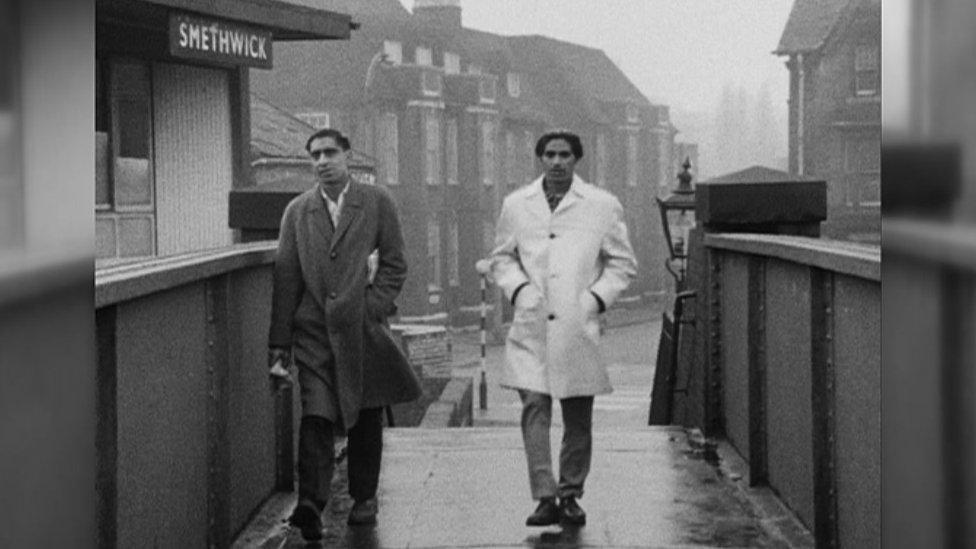
Smethwick was infamous for its racial tensions in the 1960s
Narrator James Mossman, external, the BBC journalist behind the film, commented: "So far in Britain, few things could have been so ill-prepared as immigration."
About 75,000 immigrants a year were arriving in Britain in the mid 1960s and yet there had been precious little information given to natives or newcomers about what either could expect.
Echoes of the terrible racial tensions that tore many communities apart in the 1960s are still around today. Could they have been avoided if the authorities had taken the time to prepare people for the sudden changes?
It is a theory first-wave immigrants watching the footage 50 years on believe.
Jaswinder Chaggar arrived with his family in 1966 from India.
"The working-class person had no idea what was about to hit them," he said.
"It does raise the question why, with cinema, TV and radio, why was this information not put forward?"
"[They could have said] 'We're inviting the nig-nogs over because we need them, the factories are empty.'"
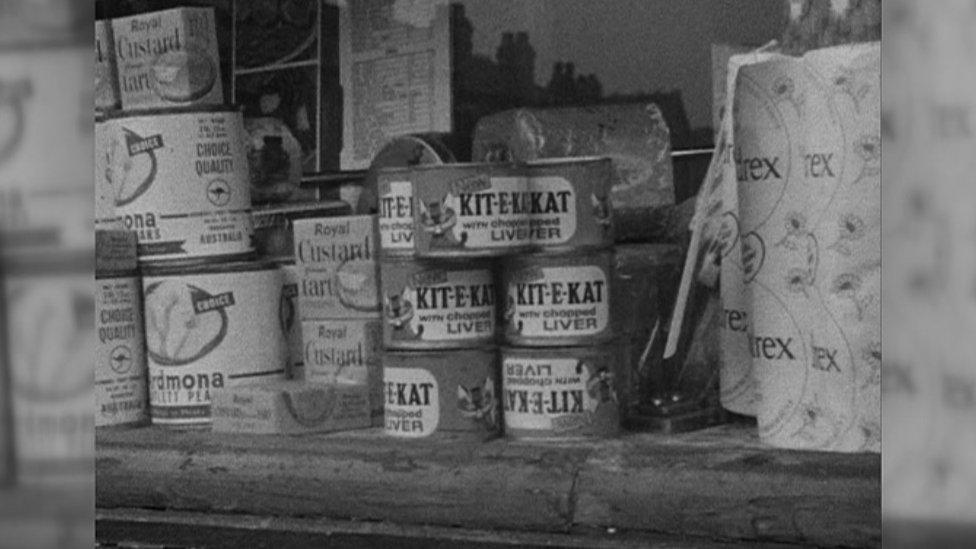
It was a belief held by some that immigrants liked to eat dog and cat food
Shirley Cooper, who came from the Caribbean to live in Birmingham at the same time, says: "People weren't prepared. They came here and didn't have all the things that they thought they'd have.
"With a bit more planning things might have been different."
Information about the influx of immigrants had been virtually non-existent. The vast majority of West Midlanders did not want to live side by side with them at all.
At the 1964 election, Conservative MP Peter Griffiths infamously won the Smethwick seat after a campaign employing the slogan: "If you want a nigger for a neighbour, vote Liberal or Labour".
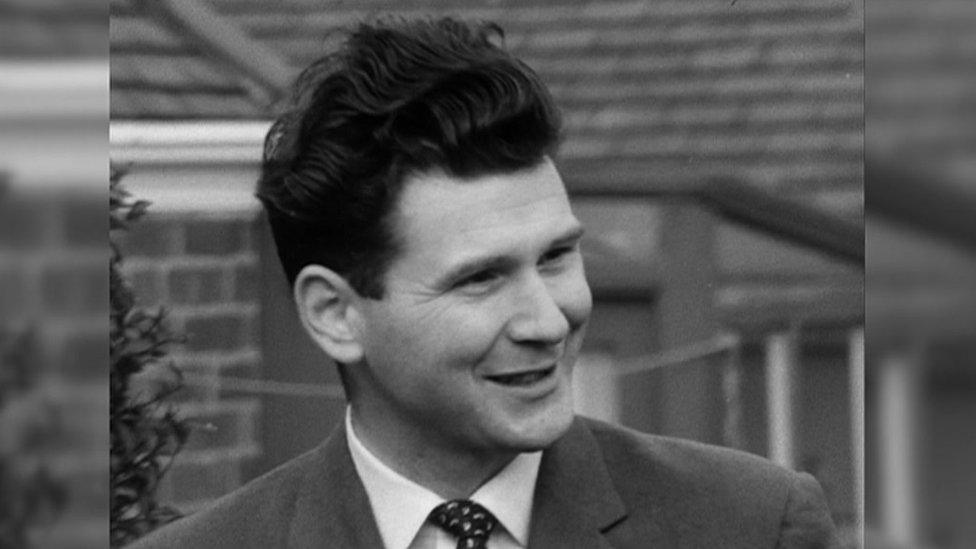
Peter Griffiths' election as Smethwick's Conservative MP in 1964 was arguably the most racist electoral campaign in British history
Mossman, a Panorama journalist known for his acerbic interviewing style, put it to Griffiths that he had exploited the anger surrounding the sudden change in cultures to win votes.
"I haven't exploited it at all," said the MP. "I have been the only political leader in the town that has been prepared to face up to the problems."
The problems were deep in all walks of life.
In what was an innovative approach for the time, an Indian man was fitted with a BBC radio microphone to record his experience of trying to get a haircut.
"We're closed now," he recorded the barber saying. "Will you clear off?"
When his visitor challenged him, insisting there was no sign in the window, and that the salon was not closed, the hairdresser replies: "Well I am. To you."
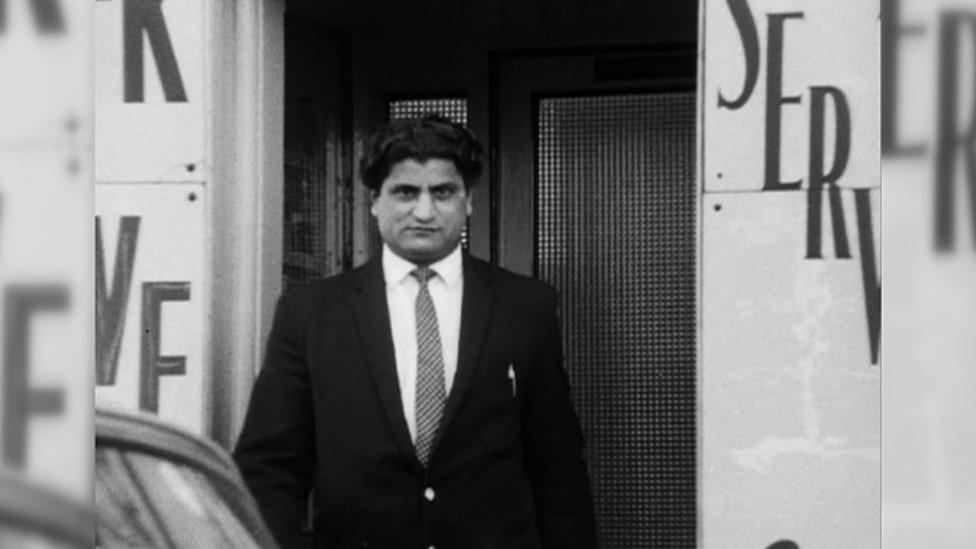
An Indian man agreed to wear a hidden BBC microphone to show the extent of the racism he faced in Smethwick
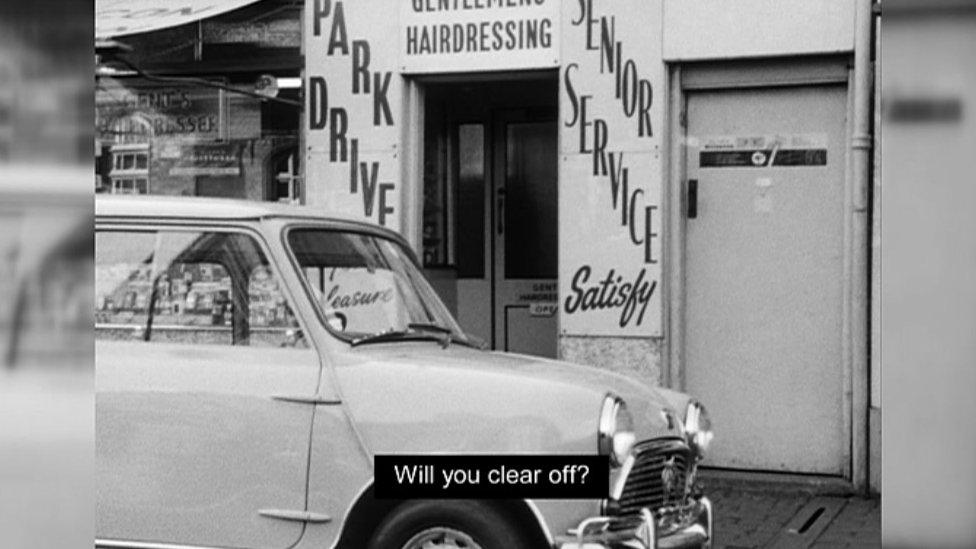
The barber repeatedly told the Indian man he would not serve him
Immigrant families would arrive for church services in their Sunday best, only to be told by clergymen to come back later so as not to upset the congregation. They were often forced to worship in their own homes.
They were used to seeing signs in windows, reading: "No Blacks. No Irish. No Dogs."
A study by the University of Birmingham at the time suggested 80% of the city's population would not let a room to any of the thousands of migrants who had come to work in Midlands factories.
They had no option but to cram their often large families into tiny homes.
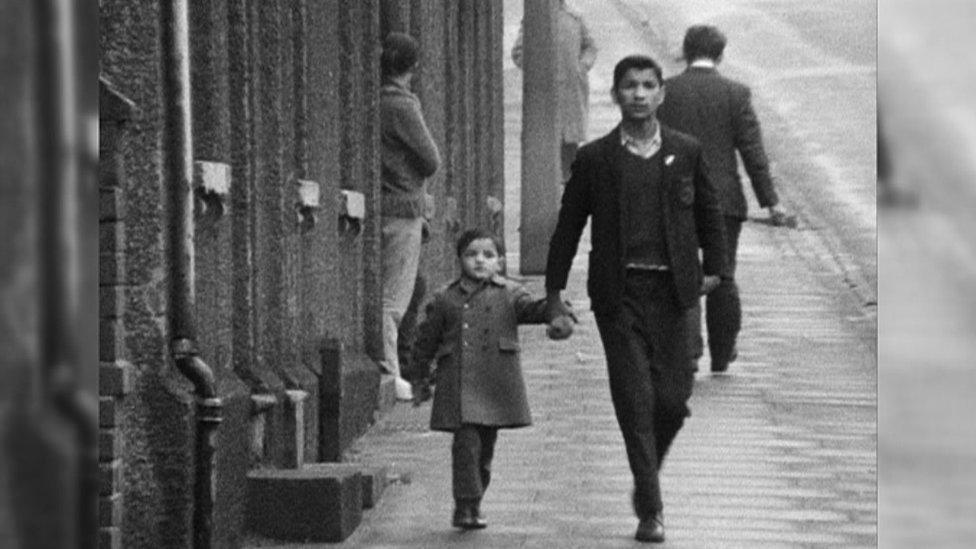
About 75,000 immigrants arrived in the UK each year in the 1960s

They had very few housing options and were often forced to live in cramped homes with their entire families
In response to the growing overcrowding crisis, councils demolished cramped back-to-backs and built upwards instead - creating dozens of tower blocks.
With their mod-cons, inside toilets and lifts, they were initially viewed as the height of modern living.
But according to Birmingham historian Prof Carl Chinn, external, the creation of high-rise flats eradicated community spirit.
"When people first moved in they thought it was great. But soon people started to realise 'where are my neighbours?'
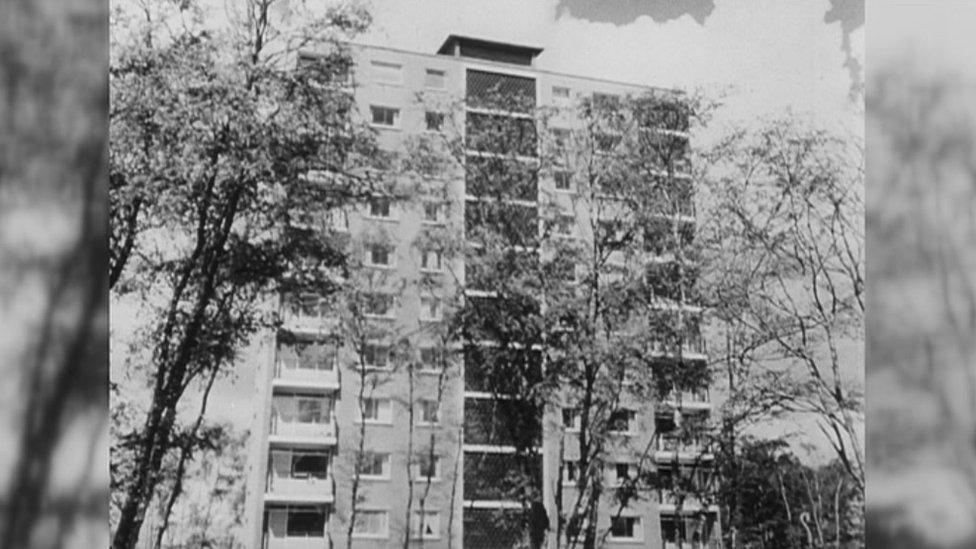
Blocks of flats replaced back-to-back houses in response to the overcrowding problems
"So what was destroyed were neighbourhoods that had taken generations to build up.
"Neighbourhood building and community building should be organic. Councils and officials can provide facilities... but they were in a hurry.
"Birmingham got 10,000 properties destroyed in the war... you can understand the need to rush forward, but perhaps they went a bit too fast.
"We should be learning lessons. It's about consultation and empowering people in their own neighbourhoods. That's the key lesson."

James Mossman was a BBC journalist known for his acerbic interviewing style
Mossman's use of undercover recordings to capture examples of racism was "groundbreaking", said Jenny Phillamore, professor of migration and superdiversity at University of Birmingham.
"I have not heard of anything like that happening before and even today that would be quite groundbreaking and controversial," she said.
Fifty years on, Prof Phillamore says the West Midlands has made huge leaps forward - but the same undercover exercise could bring similar results.
"Back in the 60s, racism would have been an everyday experience for migrants," she said.
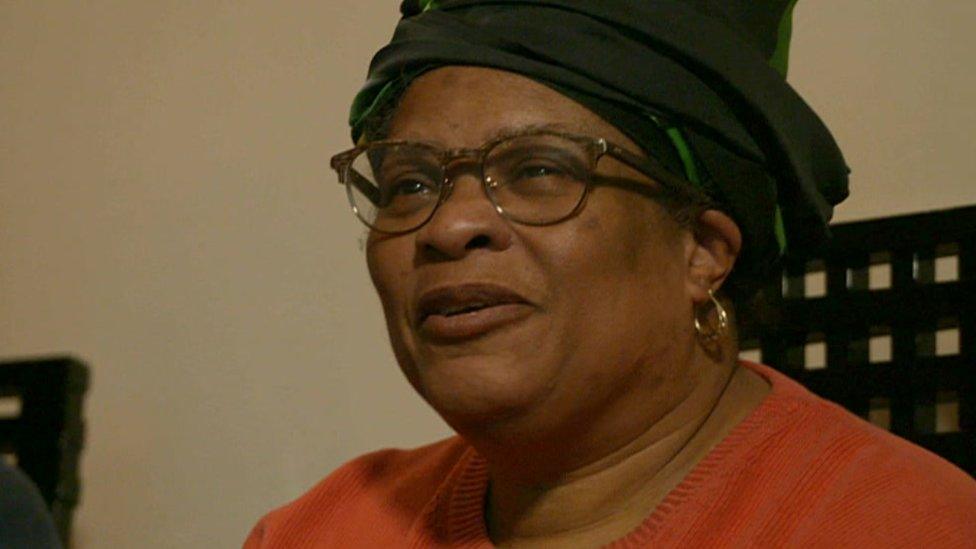
Watching clips from the 1966 documentary, Shirley Cooper, who came to Birmingham from the Caribbean, says she still experiences racist attitudes today
"Now, actually people feel they fit in, they [live in] quite convivial areas. But if you move out of those very diverse areas, people are still likely to experience racism.
"If you went undercover here I imagine you would still get racist responses but they are more complicated today.
"That tends to make people want to remain in the super-diverse areas. In Birmingham, we do now embrace the fact that we are a super-diverse city."
But Shirley Cooper says she still lives with prejudice five decades after arriving.
"A lot of what they were saying [in the documentary] is still being said now," she said.
"I've been going round trying to use a contactless card for the last month. They're not saying 'we're not going to accept your card because you're black' - they're giving me conversations about fraud.
"Or 'the machine doesn't work' and yet it worked for the person before me and after."
Living in '66, presented by Adrian Chiles, is on BBC One West Midlands on Wednesday, 1 June at 19:30 BST
- Published2 March 2016
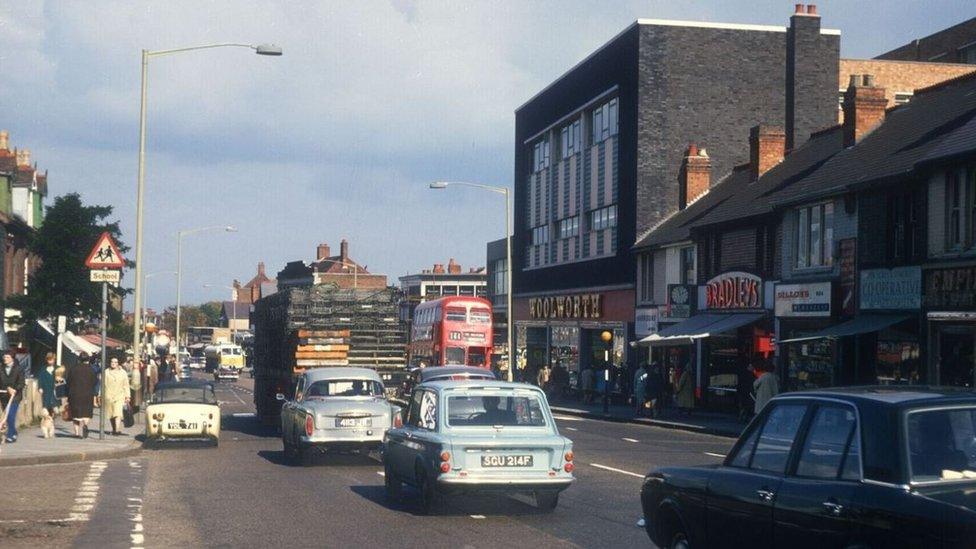
- Published12 February 2015
